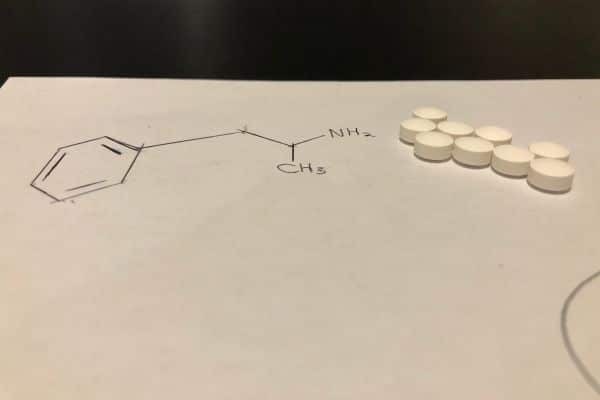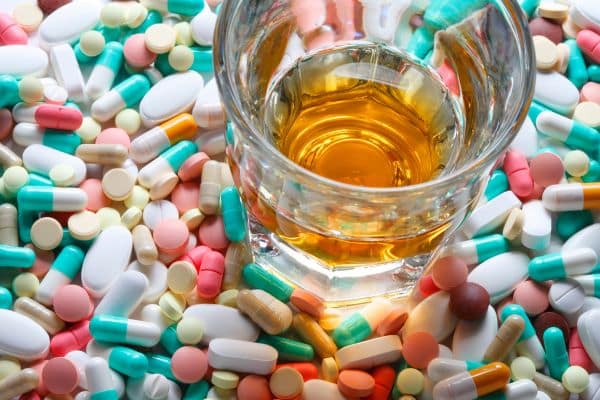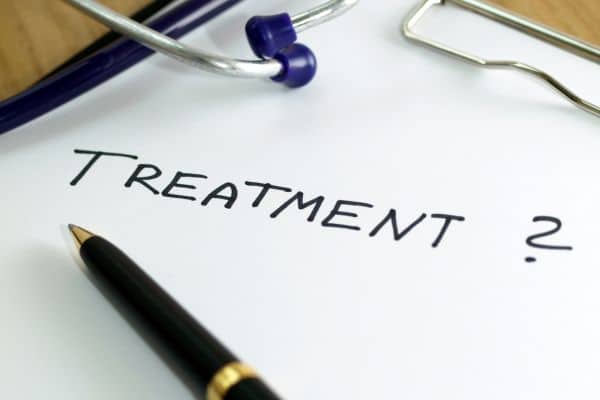Adderall stands as a well-known and widely prescribed medication for Attention Deficit Hyperactivity Disorder (ADHD) management.
Its effectiveness in helping individuals with ADHD gain better focus, manage impulsivity, and control their hyperactivity has made it a go-to choice for many.
But how does Adderall work? What exactly happens in the brain when this medication is taken, and how does it impact the daily lives of those living with ADHD? How does alcohol impact Adderall?
We’re answering all your questions about Adderall and alcohol, including ‘How exactly does Adderall affect ADHD?’
What is Adderall?

According to American Addiction Centers, Adderall is a central nervous system stimulant that combines two active ingredients: amphetamine and dextroamphetamine.
It is primarily prescribed to treat ADHD, a condition characterized by problems such as hyperactivity, impulsivity, and difficulty maintaining attention.
By enhancing the effects of certain neurotransmitters in the brain, Adderall helps improve focus, attention, and control behavior, even though it’s considered a stimulant.
How Does Adderall Affect the Brain?
The therapeutic effects of Adderall in ADHD patients are attributed to its action on the brain’s neurotransmitters, dopamine and norepinephrine.
It increases the availability of these neurotransmitters at synapses, thereby enhancing neurotransmission.
Specifically, dopamine, which plays a crucial role in reward and motivation pathways, is significantly affected.
Adderall’s ability to increase dopamine levels helps in improving attention and reducing impulsivity in individuals with ADHD.
Common Side Effects of Adderall
As a nervous system stimulant, Adderall speeds up the body’s transmission of messages and boosts responsiveness by stimulating the brain and nerves. Adderall’s most common side effects are:
- Improved mood
- Enhanced focus
- Increased heart rate and breathing
- Heightened sense of capability
- Heightened awareness
- Decrease in hyperactivity
- Reduced fatigue
In addition, Adderall has a number of undesirable or possibly dangerous side effects that worsen if the medication is not taken as directed. The following are a few detrimental effects of Adderall as outlined by Alcohol Rehab Guide:
- Circulatory issues
- Anxiety
- Constipation
- Difficulty sleeping
- Dry mouth
- Nervousness
- Headache
- Restlessness and agitation
- Aggression
- Increased heart rate
- Stomach pain
- Dizziness
How Does Alcohol Affect the Brain?
Alcohol is a central nervous system depressant that can slow down brain function and alter mood, behavior, and neuromuscular activity.
It affects the brain’s neurotransmitters, impairing communication between nerve cells and disrupting the balance needed for proper mental and physical functioning.
Alcohol increases the inhibitory neurotransmitter GABA and decreases the excitatory neurotransmitter glutamate, leading to sedative effects, impaired judgment, slowed reflexes, and decreased motor coordination.
Signs of Alcohol Misuse or Abuse
Alcoholism is a serious medical issue that should be treated by a specialist. Over 29.5 million Americans who were 12 years of age or older had an alcohol use disorder (AUD) in 2021 .
However, out of those people, only 1.4 million had AUD treatment.
This statistic from La Hacienda Treatment Center highlights how critical it is to identify the telltale signs and symptoms of alcohol consumption or overuse. Typical indicators include the following:
- Heightened alcohol tolerance
- Hiding alcohol or drinking in secret
- Letting alcohol get in the way of obligations
- Having drinking-related memory loss and blackouts
- Mood swings and agitation after abstaining from alcohol
- Unable to cut back on drinking
- Experiencing withdrawal symptoms when abstaining from alcohol
- Driving under the influence
- Making risky decisions when intoxicated
- Drinking and doing risky things like swimming, rock climbing, or unprotected sex
Why Do People Mix Adderall and Alcohol?
For a variety of reasons, people combine prescription medications with alcohol, most frequently unaware of the possible risks. For instance, some mistakenly believe that prescription medications like Adderall are always safe, especially when combined with other acceptable substances like alcohol.
Comparably, a lot of people overlook the negative consequences of combining Adderall with alcohol, or they could believe that the benefits of one drug outweigh the drawbacks of the other.
Although there are a variety of reasons why people mix Adderall and alcohol, studies suggest that alcohol use and abuse and Adderall misuse are related in young people and college students.
One of the demographics most vulnerable to excessive alcohol consumption and Adderall usage is college students. Due to the higher likelihood of alcohol use in college social interactions, many students mistakenly believe that drinking alcohol will make them feel less nervous and help them make new friends.
Meanwhile, many people turn to Adderall as a means of achieving success in both academic and social life when the burden of juggling both becomes too great to handle.
What Are the Dangers of Mixing Adderall with Alcohol?

Mixing Adderall with alcohol poses significant risks due to their opposing effects on the central nervous system.
While Adderall is a stimulant, alcohol is a depressant.
This combination can mask the depressant effects of alcohol, leading individuals to consume more alcohol than they can safely handle. This increases the risk of alcohol poisoning.
Other risks associated with mixing Adderall and alcohol include the following:
- Cardiovascular problems
- Heart failure
- Respiratory infections and bronchitis
- Dehydration, overheating, and kidney failure
- Overdose
- Heightened risk-taking behaviors
- Agitation or aggression
- Memory lapses
Treatment for Adderall and Alcohol Abuse

While each person’s needs should be taken into account when designing an addiction treatment plan, Greenhouse Treatment Center states that there are fundamental therapeutic principles that apply to all substance use disorders.
Detoxification is frequently the initial stage in the treatment of addiction. In a medically assisted detox, acute withdrawal symptoms can be treated with medicine while the patient is under the supervision of medical professionals.
Detox by itself is rarely enough to support someone in achieving long-term sobriety, even while it is a crucial initial step in therapy for many. Patients frequently require ongoing care after detoxification in order to effectively address their addiction and any related circumstances. This frequently happens in other addiction treatment settings, like residential treatment or outpatient care.
The main strategy used in the majority of successful addiction treatment programs is behavioral therapy.
Different addiction therapies are used to assist patients in becoming more motivated and self-assured, identifying harmful thought patterns and behaviors, and acquiring appropriate coping mechanisms for stress and other triggers in the future.
Engaging in peer support initiatives both during and post-treatment is highly beneficial. Keeping up a healthy and encouraging sober support system is essential for long-term sobriety.
Lastly, co-occurring disorders and polysubstance use should be addressed concurrently in a successful treatment plan.
Studies indicate that treating both conditions together is less successful than treating each one separately.
Understanding Adderall and Its Interactions with Alcohol
Adderall has been a cornerstone in the management of ADHD, offering significant benefits in terms of increased attention, focus, and behavioral control.
However, its interaction with substances like alcohol can negate these benefits and introduce substantial risks.
For more detailed information or personal advice, readers are encouraged to consult healthcare providers or visit websites like the National Institute on Drug Abuse (NIDA) and the Centers for Disease Control and Prevention (CDC), which offer extensive resources on the subjects of prescription medications and substance use.
If you or someone you know has a drug abuse problem, support is available. Make a call to 1-800-662-4357, the National Helpline of SAMHSA, to find out about local options.
Related Articles
Adderall And Alcohol FAQs
How does Adderall react with alcohol?
Combining these two substances can mask the sedative effects of alcohol, potentially leading to excessive drinking and alcohol poisoning. It can also increase the risk of cardiovascular side effects and impair judgment and decision-making. It is strongly advised to avoid consuming alcohol while taking Adderall and to consult with a healthcare professional for personalized advice.
How does alcohol affect ADHD?
Alcohol does not effectively treat ADHD and is not a recommended course of action. In fact, alcohol can exacerbate the symptoms of ADHD and negatively impact individuals with the condition. It impairs cognitive function, reduces attention span, and can lead to impulsive behavior, all of which are counterproductive for someone with ADHD.
Can I drink alcohol when my Adderall wears off?
Even when Adderall is no longer active in your system, it is still important to exercise caution with alcohol. The stimulant effects of Adderall can wear off relatively quickly, but the drug can remain detectable in your body for several days. It is best to avoid alcohol while taking Adderall and consult your healthcare provider for guidance on when it may be safe to consume alcohol after discontinuing the medication.
What not to drink with ADHD?
Individuals with ADHD should be mindful of their diet and beverage choices. It is generally a good idea to limit or avoid the following:
– Excessive caffeine
– Sugary drinks
– Energy drinks
– Alcohol
What are the alternatives to Adderall?
There are several alternatives to Adderall for managing ADHD. These alternatives include:
– Other stimulant medications
– Non-stimulant medications
– Behavioral therapy
– Lifestyle changes
Ultimately, the choice of treatment should be made in consultation with a healthcare professional who can assess the specific needs and circumstances of the individual with ADHD.
